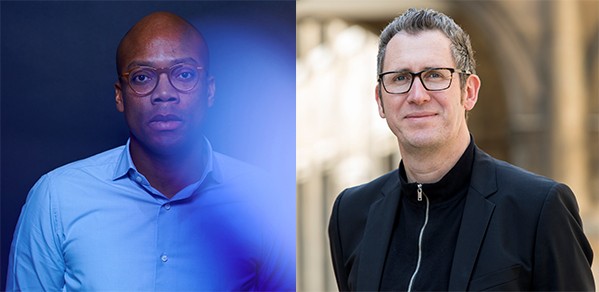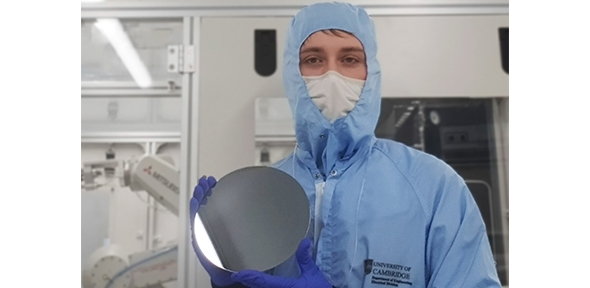
The Physical Computation Laboratory and The Hofmann Group from the Department of Engineering are among the recipients of funding delivered under a new programme designed to support adventurous, high-risk research.
This government funding will allow some of our brightest mathematicians and physicists to channel all their creative ingenuity into achieving potentially life-changing scientific breakthroughs.
Science Minister Amanda Solloway
Announced today (18 December), the Engineering and Physical Sciences Research Council (EPSRC), part of UK Research and Innovation (UKRI), has allocated almost £25.5 million of funding to 126 adventurous projects in the mathematical and physical sciences, through the highly competitive New Horizons pilot programme. A review process focused on the transformational potential of the research.
Dr Phillip Stanley-Marbell, Assistant Professor in the Electrical Engineering Division, leads the Physical Computation Laboratory. The New Horizons project will complement the research team’s ongoing work in exploiting information about the physical world to make more efficient computing systems that interact with nature.
The Physical Computation Laboratory will investigate new frontiers in efficient in-processor representations of probability distributions that could enable new classes of computing systems that natively perform arithmetic and logic on probability distributions. All physical measurements have measurement uncertainty and are best represented with probability distributions. Examples of increasingly-important applications of this concept, in both research and industry, are measurements from sensors feeding machine learning algorithms and measurements of the outputs of quantum computing hardware to obtain their final results.
Dr Stanley-Marbell said: “In the long term, the results of our investigation could be transformative for future Bayesian machine learning methods and could enable fundamentally new microprocessor architectures for processing the distributional outputs of Noisy Intermediate-Scale Quantum (NISQ) computers.
“The implications and fundamental impact on science, as well as impact on commercial applications are exciting: imagine a world, where the computers controlling autonomous systems are better able to keep track of the uncertainties in the data from sensors to inform more realistic control decisions. What’s the point of being able to perform billions of calculations per second on data from sensors to control an autonomous system, when you can’t track how unreliable the original sensor data and intermediate computation results might be?"
The research group led by Stephan Hofmann, Professor of Nanotechnology and Director of the EPSRC Centre for Doctoral Training in Nanoscience and Nanotechnology, is based in the Electrical Engineering Division. The New Horizons project will see the research team explore the thinnest possible materials for electronic devices, pioneering new approaches of materials growth at the atomic monolayer level. A monolayer of a material represents the ultimate thinnest film possible.
High-tech applications ranging from information and communications technology (ICT) and lighting through to energy storage, energy generation and catalysis, build on material deposition technology, which over the last decades has moved from bulk, to thin films to nanotechnology. To date, the focus has been on the isolation of monolayer crystals from materials for which the natural phase is layered. The Hofmann Group will explore new growth strategies down to the monolayer limit for non-layered structures.

Dr Vitaly Babenko shows an exemplar silicon wafer that will be used as a substrate to make electrical devices and test the properties of novel atomically-thin materials arising from the New Horizons programme.
Dr Vitaly Babenko, a Research Associate in the group who co-wrote the application for funding from New Horizons, said: “Rather than peeling layers with sticky tape from bulk layered crystals, such as graphite, we have been working for many years on industrially scalable manufacturing for ultra-thin materials with chemical vapour deposition and related methods. We are very excited about this opportunity to attempt, for the first time, to grow atomically-thin films of non-layered crystals, such as functional oxides.”
“The funding from the New Horizons call will allow us to develop new fundamental understanding and material systems, while targeting compatibility with current wafer-scale electronics industry from the outset,” he added.
Based on support from the Department of Engineering and recent investments in both growth and characterisation equipment, specifically for these materials at Cambridge, The Hofmann Group has developed unique capabilities to enable live ‘in-operando’ observations and chemical characterisation of crystal nucleation and growth inside miniaturised reactors at industrially relevant conditions.
Professor Hofmann said: “This is the product of many industry partnerships and interdisciplinary collaborations, particularly across the West Cambridge campus. It puts us in a fantastic position to open a new horizon of possibilities for crystal phase control and hence materials design and tailoring of properties at the atomic level.”
Science Minister Amanda Solloway said: “It is critical we give the UK’s best researchers the resources to drive forward their revolutionary ideas so they can focus on identifying solutions to some of the world’s greatest challenges, such as climate change.
“This government funding will allow some of our brightest mathematicians and physicists to channel all their creative ingenuity into achieving potentially life-changing scientific breakthroughs – from mathematics informing how we save our rainforests to robotics that will help track cancer faster.”
EPSRC Executive Chair, Professor Dame Lynn Gladden, said: “New Horizons reflects EPSRC’s commitment to funding creative, transformative and ambitious new ideas across our portfolio. In this pilot, we have funded more than 100 projects in the mathematical and physical sciences.
“The scheme also piloted a new, simplified applications process designed to minimise the administrative burden of submitting grant applications, thereby enabling researchers to focus on developing their research ideas.
“The call for proposals attracted a very positive response in terms of both the number and quality of applications and we look forward to exploring how to include the approaches taken through New Horizons in further areas of our portfolio.”
EPSRC will now evaluate the pilot and the outcomes of New Horizons in line with the wider UKRI Reforming our Business programme and consider how the approaches taken through New Horizons can be included in future activities.
Further information on the New Horizons streamlined application process.

